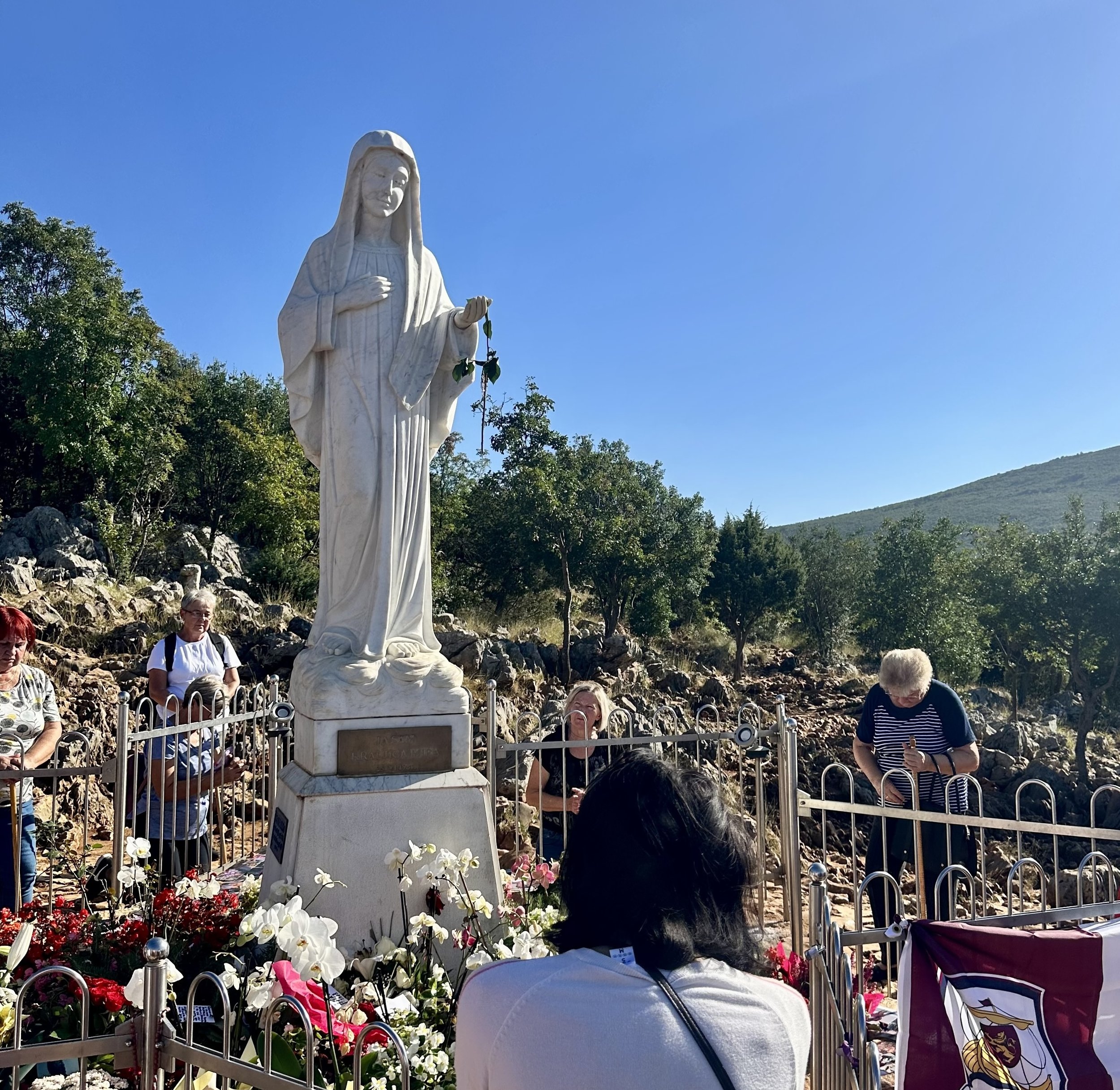Travelog: Medjugorje (Prophets & Visions)
“The Descent of the Holy Ghost” bronze relief on Apparition Hill, Medjugorje
Medjugorje is a rural village about a half an hour from the cultural center of Mostar, in the southern part of the country of Bosnia and Herzegovina.
It’s an unofficial Catholic pilgrimage site where the Virgin Mary reportedly appeared to six children with a message of love, healing and mercy: “I have come to tell the world that God exists. He is the fullness of life, and to enjoy this fullness and peace, you must return to God.”
Apparition Hill
True to its name, Apparition Hill is the place where Mary was said to have first appeared to the children in 1981. She has continued to appear to them at intervals since then, according to the six “visionaries,” as they’re called.
Getting to the site involves a treacherous climb through jagged rocks that jut out of the ground at all angles.
As I struggled up the path in the beating sun, there did seem to be elements of the supernatural involved when I saw elderly women somehow navigating the rocks (that really did look like bones in an excavation site).
At the top of the hill, I joined the mostly women who had come to pray at the statue of the Virgin Mary and the sculpture of Jesus on the cross that had been erected at the apparition site. I’m not Catholic, but I’m drawn to any pathway to God. And I feel a kinship with those who pray.
We looked different, used different words and gestures, but we were the same in our state of being—acknowledging our powerlessness to control the circumstances of our lives and the world around us, and our belief in a higher source of power, love, healing, reconciliation and change available to us. We were there for the same reason. To feel closer to God.
The Prophet
Sometime during my adolescence, my mom started believing in a local prophet named Mrs. Hong. Before she became “the prophet,” she was a fellow church member we saw often and someone I remembered as a nice soft-spoken woman with a ready smile.
One day, her whole demeanor changed. She started moving more slowly and deliberately like she was under water. She opened her eyes a bit too wide and spoke in a hallow voice that came out more like an echo, claiming that her words were coming directly from Jesus the Christ. But mostly she just sat there quietly, sometimes looking over at us benignly, and we started getting used to her being around that way.
Later, we heard that Mrs. Hong lived with a husband who would beat her. I imagined the poor woman, struggling to endure the conditions of her life, escaping the only way she could, into a new reality.
That period of time was also when my mom was at her most delusional. She had always been eccentric, unreasonable, and volatile. But these years were next level.
My mom became a devoted disciple of the prophet, convinced that Mrs. Hong was a direct conduit to Jesus, “walking with him and talking with him 24 hours a day,” she would recite regularly.
During these years, my mom started restricting her diet to black beans, rice and pickles, which somehow pleased God. She couldn’t tolerate the color black (the color of the devil). She’d drive us around in a minivan with an enormous magnet banner on the side that said, “Jesus lives!” She fasted for 40 days and 40 nights because, well, Jesus did. And this was also when the crows started speaking to her—telling her ecstatic tales of God’s love for her.
She got reprimanded by our church for trying to spread her new beliefs and practices, extolling the arrival of the prophet. That church was pretty wild in their Korean brand of pentecostalism. So for them to tell her to tone it down was really saying something.
I’ve come to understand some things about that time in my mom’s life. Mainly that she was going through menopause. This came out during a recent conversation when I told her that I was entering menopause. In her own way, her response was along the lines of, “That shit’s real.” She described a physical and psychological turmoil that I have become very familiar with.
What I’ve learned is that each woman’s menopause experience both physically and emotionally will be entirely their own, based on the makeup of their body, mind and past experiences.
For my mother, who carried the unresolved trauma and wounds from the Korean War and growing up in a violent hate-filled family, menopause triggered a kind of schizophrenia. A religious schizophrenia, which also made sense.
Christian missionaries from the West had given my mother a lifeline after the war. My mom often tells the story of when she was nine years old living in a refugee camp in Busan. How during a bitter cold winter, she received a blanket and some tenderness from the missionaries. From that moment on, she was devoted to the church. They let my mom shelter in the church during harsh weather, and later the missionaries paid for her tuition to a private school that began her climb out of poverty. The faith she developed gave her comfort at a time that she desperately needed it. The church saved her in all senses.
So when Mrs. Hong transfigured into the prophet, my trauma-scarred menopause-addled mother accepted her with open arms. An avatar of Jesus sent directly to her front door. She was ecstatic.
What I realize now is that the prophet didn’t recruit my mom and fill her head with delusions. They were just two troubled women experiencing a break from their realities together.
And in fact, according to my mom, the prophet had always steered her towards responsible behavior. Even things like, “You shall take your medications every day as directed.”
The prophet was an accepting, attentive and reliable companion to my mom during those years. That was something she didn’t have in her husband, family or in the Korean community. She and the prophet were a schizophrenia support group of two.
Mrs. Hong moved away years ago, but my mom still talks about her wistfully, like remembering a first love.
At the top of Apparition Hill that day in Medjugorje, I thought of the prophet. Wherever she was, if she was still alive, I hoped she had loving and kind people around her. I thanked her for being there for my mom when no one else was. For giving her hope and comfort during her darkest time. “My mom’s well now,” I told her. “She’s finally happy. I hope you are, too.”


